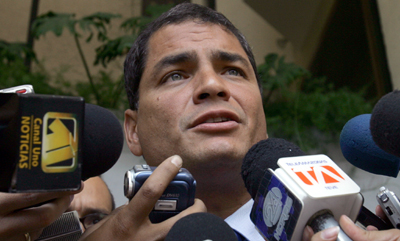April 18, 2011
President Rafael Correa
Palacio de Carondelet
García Moreno 1043, entre Chile y Espejo
Quito, Ecuador
Via facsimile: 593-2-258-0714
President Correa:
With a referendum approaching that may restrict news content and weaken news media companies, we are deeply concerned about Ecuador’s commitment to freedom of expression.
The vote, scheduled for May 7, will ask Ecuadorans several questions on a range of issues. The 10-point ballot includes, among other things, creation of a council to regulate media content and a prohibition against media companies having holdings in other industries. The political opposition, local reporters, and press activists believe that your initiative is bent on concentrating power and censoring the press.
Under the guise of curbing “media excesses,” the ballot asks Ecuadorans to approve a communications law that would, in turn, create a regulatory council. The council would regulate radio, television, and print content in broad and vaguely defined areas such as violence, sex, and discrimination. The language of the provision appears to allow the council to unilaterally set potential penalties.
We believe this vague provision would open the door to government censorship. Ecuadoran journalists and advocates said the provision would violate Article 13 of the American Convention on Human Rights, which guarantees freedom of expression and forbids censorship.
Your administration has tried and failed to pass similar, restrictive legislation in the National Assembly. The 2010 communications bill, which stalled in the assembly, included restrictive provisions and vague demands that news media run “truthful information.”
The ballot also asks voters to restrict investment in local news media. The proposal would bar “private national media companies, executives, and main shareholders” from holding assets in other companies. Investors would have two years to divest. Voter approval of this measure would be the first step toward a requisite constitutional amendment.
Ecuadoran journalists and free press advocates have said the proposal runs counter constitutional guarantees on freedom of expression, as well as guarantees enshrined in Article 13 of the American Convention on Human Rights. Critics say the measure appears intended to weaken the finances of media that oppose your government’s policies.
Your disdain for news media is no secret. Your administration has repeatedly used cadenas to preempt private broadcasts and impose your own views, which have included calling journalists “ignorant, “trash-talking,” and “liars.” More recently, you filed a criminal defamation complaint against the critical daily El Universo, three of its executives, and the op-ed editor concerning a February 6 column that criticized your performance. CPJ believes that in this case you have put your own reputation ahead of the national interest of ensuring a robust public debate.
We believe the referendum questions are aimed at stifling voices that oppose your administration. We urge you to immediately withdraw these questions and respect the guarantees on free expression that are enshrined in the constitution and international treaties.
Sincerely,
Joel Simon
Executive Director
